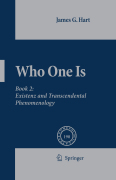
In this Book 2 we discuss chiefly one’s normative personal-moral identity which stands in contrast to the transcendental I where one’s non-sortal unique identity is given from the start. This moral identity requires a unique self-determination and normative self-constitution which may be thought of with the help of the metaphor of “vocation. We will see that it has especial ties to one’s Existenz as well as to love. This Book 2 claims that the moral-personal ideal sense of who one is is linked to the transcendental who through a notion of entelechy. The person strives to embody the I-ness that one both ineluctably is and which, however, points to who one is not yet and who one ought to be. The final two chapters tell a philosophical-theological likely story of a basic theme of Plotinus: We must learn to honor ourselves because of our honorable kinship and lineage “Yonder. A unique transcendental-phenomenological appropriation of the themes of Existentialism and the appropriation of the theme of Existenz A unique development of the themes of conscience and moral obligation within the framework of transcendental phenomenology A rare development of the themes of the constitution and identity of the moral person that uses the metaphor of vocation INDICE: Preface. 1. Assenting to My Death and that of the Other. 2. Transcendental Attitude and the Mystery of Death. 3. Existenz, Conscience, and the Transcendental I. 4. Ipseity and Teleology. 5. The Calling of Existenz. 6. Philosophical Theology of Vocation. Part One: Historical Setting. 7. PhilosophicalTheology of Vocation. Part Two: Systematic-Theological Synthesis.
- ISBN: 978-1-4020-9177-3
- Editorial: Springer
- Encuadernacion: Cartoné
- Páginas: 630
- Fecha Publicación: 01/05/2009
- Nº Volúmenes: 1
- Idioma: Inglés
